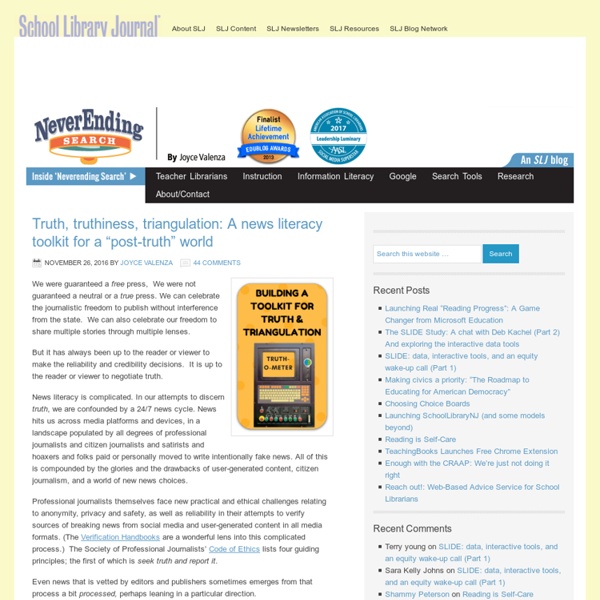Real Solutions to Fake News: How Libraries Help
Skip to main content You are here: Home » Activities and Groups » Information Society » News » Real Solutions to Fake News: How Libraries Help Search form 20 August 2017 From the Annual Conference
Lesson plan: How to teach your students about fake news
Fake news is making news, and it’s a problem. Not only did a BuzzFeed data analysis find that viral stories falsely claiming that the Pope endorsed Donald Trump and that Hillary Clinton sold weapons to terrorists receive more Facebook attention than the most popular news stories from established news outlets, but a false story about child trafficking in a Washington, D.C. pizza restaurant inspired a North Carolina man to drive 5 hours with a shotgun and other weapons to investigate. This lesson gives students media literacy skills they need to navigate the media, including how to spot fake news.
PolitiFact's guide to fake news websites and what they peddle
At first look, BostonTribune.com certainly seems a trustworthy source. So does KMT11.com. And ABCNews.com.co. Even 24wpn.com has an official ring to it. But all of these websites peddle bogus stories, either by making up fake news or sharing it from other sources.
Information Power
The mission of the library media program is to ensure that students and staff are effective users of ideas and information. This mission is accomplished: by providing intellectual and physical access to materials in all formats by providing instruction to foster competence and stimulate interest in reading, viewing, and using information and ideas by working with other educators to design learning strategies to meet the needs of individual students. --Information Power: Guidelines for School Library Media Programs (1988), p.1 The mission statement for Information Power: Guidelines for School Library Media Programs is as relevant today is it was in 1988, and so it remains the mission statement for the information literacy standards for student learning as well and for Information Power: Building Partnerships for Learning.
Republican Strategist Frank Luntz on Toxic Politics
THESE ARE PEOPLE IN THEIR 70s AND IF THEY BEHAVE THAT WAY THEN DON'T YOU THINK IN THE PEOPLE IN THEIR 40s WILL FOLLOW THEM AND PEOPLE IN THEIR TEENS WILL FOLLOW THOSE? WE ACTUALLY HAD ONE AND HIS NAME IS JOHN McCAIN AND HE WANTED TO CHOOSE JOE LIEBERMAN. McCAIN, LIEBERMAN AND YOU KNOW WHAT HAPPENED. McCAIN WAS DESTROYED AND WE TOLD HIM IT WOULD BLOCK YOUR NOMINATION IF YOU WOULD DO THIS AND WE WERE EVEN MORE HYPED UP AND MORE PARTISAN TODAY, AND YOU CAN'T WISH.
School Librarians Are Teaching Digital Citizenship
April Wathen photo: Jill Springer April Wathen, Kathy Lester, and Steven Yates. As technology and social media play an increasingly big role in the classroom, educators are faced with challenges of teaching students how to use technologies in appropriate ways, and how to be safe and responsible online—the basic tenets of what is known as digital citizenship, a close relative of digital literacy. Fortunately, classroom teachers often have an expert ally to assist them in getting the job done: their school librarian or media specialist. “Digital citizenship and digital literacy—and, in the bigger picture, information literacy—whether it’s print or digital, that is our curriculum,” says Gwenn Marchesano, a middle school librarian in Plymouth, Mich.
News and Media Literacy: Building Critical Consumers and Creators
Presented by Kelly Mendoza, Senior Director of Learning and Engagement, Common Sense Education Hosted by Common Sense Education and Sponsored by Symantec If you attended the live session, you’ll be emailed a CE certificate within 24 hours of the webinar. If you view the recording and would like a CE certificate, join the Digital Learning & Leadership community and go to the Webinar Archives folder to take the CE quiz. More and more, young people (and adults) are getting their news online and from social media. There is also the increasingly problematic issue of fake news and determining credible news sources online. In an age of pervasive, fast, and on-demand information, there is a need for educators and parents to teach news and media literacy to kids.
Sorting the Real Sandy Photos From the Fakes
With Hurricane Sandy approaching the New York metro area, the nation's eyes are turning to its largest city. Photos of storms and flooding are popping up all over Twitter, and while many are real, some of them -- especially the really eye-popping ones -- are fake. This post, which will be updated over the next couple of days, is an effort to sort the real from the unreal. It's a photograph verification service, you might say, or a pictorial investigation bureau. If you see a picture that looks fishy, send it to me at alexis.madrigal[at]gmail.com.
Truth: Notes from Session 1 of TED2019
Poet and educator Sarah Kay encourages us to welcome the beauty of the universe, however it may appear. She speaks during Session 1 of TED2019: Bigger Than Us, on April 15, 2019 in Vancouver, BC, Canada. (Photo: Bret Hartman / TED) The world feels fragile these days, a bit wobbly. How do we figure out a way forward?



